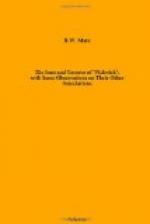“’ Very good, sir.’ Here he walked softly to the door, and then stopping short, turned round and said with great suavity:
“‘Shall I send the chambermaid, gentlemen?’
“‘You may if you please,’ replied Mr. Pickwick.
“‘If you please, sir.’
“‘Bring some soda water,’ said Bob Sawyer.
“‘Soda water, sir? Yes, sir.’ And with his mind apparently relieved from an overwhelming weight by having at last got an order for something, the waiter imperceptibly melted away. Waiters never walk or run. They have a peculiar and mysterious power of skimming out of rooms, which other mortals possess not.”
Eventually Mr. Pickwick and his friends arrived safely at the house of Mr. Winkle, and, having concluded the interview, all three returned to the hotel and went “silent and supperless to bed.”
The next day was a dreary and wet one, and, in contemplating the aspect from his bedroom window, Mr. Pickwick was attracted by a game cock in the stable yard, who, “deprived of every spark of his accustomed animation, balanced himself dismally on one leg in a corner.” Then Mr. Pickwick discovered “a donkey, moping with drooping head under the narrow roof of an outhouse, who appeared from his meditative and miserable countenance to be contemplating suicide.” In the breakfast-room there was very little conversation; even Mr. Bob Sawyer “felt the influence of the weather and the previous day’s excitement, and in his own expressive language, he was ‘floored.’ So was Mr. Ben Allen. So was Mr. Pickwick.”
[illustration: The Old Royal Hotel, Birmingham. Drawn by L. Walker]
The Pickwickians’ visit, therefore, to the Royal Hotel was not a very bright and lively one, but they endeavoured to make the best of it.
“In protracted expectation of the weather clearing up, the last evening paper from London was read and re-read with an intensity of interest only known in cases of extreme destitution; every inch of the carpet was walked over with similar perseverance, the windows were looked out of often enough to justify the imposition of an additional duty upon them, all kinds of topics of conversation were started, and failed; and at length Mr. Pickwick, when noon had arrived without a change for the better, rang the bell resolutely and ordered out the chaise.”
And so they started on their journey back in spite of the miserable ’outlook, feeling it was “infinitely superior to being pent in a dull room, looking at dull rain dripping into a dull street.”
But Mr. Pickwick’s lack of enthusiasm over the hotel was not due to the hotel itself, but more on account of the weather. As a fact, it was a very important hotel in those days. Attached to it were large assembly and concert rooms, erected in 1772 by Tontine. It was known as the Hotel, the distinctive appellation of “Royal” being prefixed in consequence of a visit of a member of the royal family who took up his residence there for a time.




